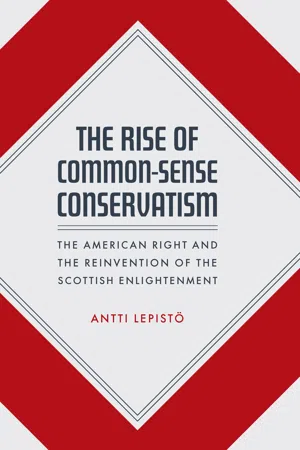
The Rise of Common-Sense Conservatism
The American Right and the Reinvention of the Scottish Enlightenment
- English
- ePUB (mobile friendly)
- Available on iOS & Android
The Rise of Common-Sense Conservatism
The American Right and the Reinvention of the Scottish Enlightenment
About This Book
In the years following the election of Donald Trump—a victory that hinged on the votes of white Midwesterners who were both geographically and culturally distant from the media's coastal concentrations—there has been a flurry of investigation into the politics of the so-called "common man." The notion that the salt-of-the-earth purity implied by this appellation is best understood by conservative politicians is no recent development, though. As Antti Lepistö shows in his timely and erudite book, the intellectual wellsprings of conservative "common sense" discourse are both older and more transnational than has been thought.In considering the luminaries of American neoconservative thought—among them Irving Kristol, Gertrude Himmelfarb, James Q. Wilson, and Francis Fukuyama—Lepistö argues that the centrality of their conception of the common man accounts for the enduring power and influence of their thought. Intriguingly, Lepistö locates the roots of this conception in the eighteenth-century Scottish Enlightenment, revealing how leading neoconservatives weaponized the ideas of Adam Smith, Thomas Reid, and David Hume to denounce postwar liberal elites, educational authorities, and social reformers. Their reconfiguration of Scottish Enlightenment ideas ultimately gave rise to a defining force in modern conservative politics: the common sense of the common man. Whether twenty-first-century politicians who invoke the grievances of "the people" are conscious of this unusual lineage or not, Lepistö explains both the persistence of the trope and the complicity of some conservative thinkers with the Trump regime.
Frequently asked questions
Information
Table of contents
- Cover
- Title Page
- Copyright Page
- Contents
- Introduction: Speaking for the People in Culture Wars–Era America
- 1 The Coming of the Neoconservative Common Man
- 2 James Q. Wilson and the Rehabilitation of Emotions
- 3 Family Values as Moral Intuitions: Neoconservatives and the War over the Family
- 4 Moral Sentiments of the Black Underclass: Race in the Neoconservative Moral Imagination
- 5 Retributive Sentiments and Criminal Justice: James Q. Wilson on Crime and Punishment
- 6 Elite Multiculturalism and the Spontaneous Morality of Everyday People: Francis Fukuyama’s Culture Wars
- Epilogue: Conservative Intellectuals and the Boundaries of the People
- Acknowledgments
- Notes
- Bibliography
- Index